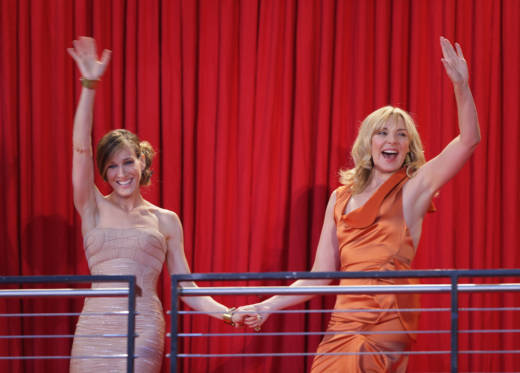The diss was immediately pounced on and spread all over the world. Every news and/or entertainment website in the U.S. (from the Washington Post to Just Jared, and everything in between) covered the story. In the U.K., daily newspapers from the highbrow Guardian to the tabloid Sun had a take on it (the latter calling the women “Famous Frenemies”). Even the South China Morning Post talked about the “long-running catfight.”
Other celebrities were quickly dragged in for comment. Andy Cohen rushed to defend his friend, Parker. Molly Shannon kind of did the same, even though she hadn’t even seen Cattrall’s posts at the time she was asked about it. Dean Winters—one-time Sex and the City actor and Parker’s current co-star in HBO’s Divorce—was forced to tell US Magazine that he tries “to stay out of that bullshit, you know what I mean?”
At this point in time, it has been, even by conservative estimates, at least 10 years since we first had to hear that Sarah Jessica Parker and Kim Cattrall didn’t really like each other. Both actresses worked hard to dispel the rumors at first, Parker telling Elle in 2009: “I don’t think anybody wants to believe that I love Kim. I adore her.”
In early 2010, Cattrall backed up SJP’s sentiments to The Daily Mail: “I think Sarah is fantastic. She is a born leader and she guides the crew and the cast in such a strong but gentle way. She and I are sick of this. It’s exhausting talking about it, and a real bore.”
Sex and the City was immediately hailed as feminist when it hit TV screens in 1998, because Carrie, Samantha, Charlotte, and Miranda individually represented powerful, independent women, and, together, represented female solidarity and the importance of sisterhood. Female viewers both identified with and felt empowered by these characters.
If Sex and the City represented a generation of women who were liberated, in part, by their support for one another, the Parker-Cattrall so-called feud pushes the old stereotype that women are natural-born competitors who just cannot help tearing each other down. It tells women around the world: This Is Why We Can’t Have Nice Things.
If Sex and the City was designed to raise us up, the coverage of Parker and Cattrall is often tailor-made to bring us back down to Earth with a thud. It tells women over and over that it wasn’t just the clothes in that show that were a fantasy—but successful friendships between strong women were too.
Cattrall’s lashing out at Parker, in the midst of what must be unbearable grief, speaks more to the amount of pain Cattrall is currently in than how much she actually hates Sarah Jessica Parker. It’s abundantly clear now that, yes, Parker and Cattrall don’t get along. But it’s also pretty obvious that if they weren’t both women, this story wouldn’t attract such a dizzying array of reporting.
To put it in perspective, did you know about Jamie Foxx and LL Cool J’s feud? The longstanding one that even caused a fight to break out on the set of Oliver Stone’s Any Given Sunday? No? Well, cops were called and everything, but few people have since questioned their friendship, even when they occasionally work together.
In her Instagram post directed at Sarah Jessica Parker, Cattrall also left a link to a New York Post piece from last year, titled Inside the mean-girls culture that destroyed ‘Sex and the City.’ That headline is telling. “Mean girls”, both in the movie of the same name and the book it was based on, is a reference to a specific kind of teenage girl. Applying it to successful, middle-aged career women is belittling, at best.
There is a twisted pleasure embedded in our culture that comes with seeing two women hate on each other. It’s the reason brawls are such an important part of female-centric reality shows (see: The Real Housewives and Little Women). It’s the reason the Katy Perry-Taylor Swift rift has been dissected far more thoroughly than rapper beefs between men. (Even Drake v. Meek Mill!)


